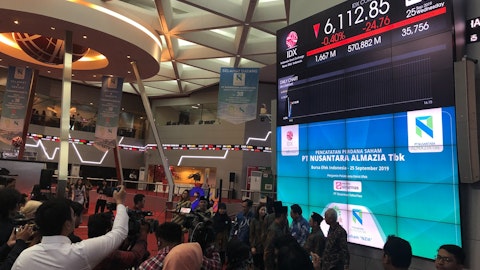God forbid, if there is another pandemic that we have up to the minute, up to the second data about how that country’s infrastructure is managing the hospitalization rates and vaccination rates and all of those things, so we can better deploy and manage our resources during a pandemic. So, we don’t have a repeat of the things that went on during COVID-19. So, I expect — Safra just gone back from visiting some prospective customers that are countries that we will be signing contracts with a number of countries to build these national systems. And these contracts are enormous, I mean, absolutely enormous. And there will be several of them. So, as I said in my note in the press release, the scale of this healthcare opportunity is unprecedented but so are the responsibilities that go along with it.
We have to — we, as humanity has to do a better job of delivering healthcare to people than we have done historically. And we can never have a repeat of the COVID-19 pandemic. And I think there is this worldwide sense of urgency and national consciousness about getting a new generation of systems out there that help us at first prevent and then manage our healthcare — prevent a pandemic and better manager healthcare systems. As far as I know, Oracle is the only company in the world that’s trying to address this issue. And we’re about to sign up a number of countries that will work with us on doing just that.
Operator: And we’ll take our final question this afternoon from Raimo Lenschow at Barclays.
Raimo Lenschow: Hey. Thanks for squeezing me in. One quick question. If you think about the global environment, usually, it’s not the time to look at or in the olden days, I remember when I was at PwC, it wasn’t the time to kind of look at your back office systems, but you’re kind of growing really nicely. NetSuite is actually kind of outgoing now Fusion a little bit. Can you talk a little bit about the drivers and what you’re seeing out there? Thank you.
Safra Catz: Yes. Let me start that, and Larry can add if you want. So I want to remind you that we are global, right, which includes whether we’re in Europe and in the United States, but we’re also in the Gulf states and really in Asia, different parts, Latin America. And there are always companies that get to the point where their business, they cannot afford to keep using their older systems. They spend too much using them. They spend too much running them. And they are actually holding them back, and they know that. And I think one of the things many companies learned during COVID was those companies that did not get on some sort of a track to get a digital connection with their customers, employees and suppliers that were at a huge disadvantage.
And so that momentum continues. And it is possible that any individual country or location there could be some little slowdown here or there. And yet there are other countries and industries that are doing incredibly well and they view this as critical. When customers move to SaaS they end up spending less but also have much better capabilities to sell more to work with their employees and their suppliers, and of course, as I said, their customers. So that momentum has started, has started, and it just continues very, very strongly. And again, we are global. So, even when there are some issues in some regions, we’re in other regions that are doing phenomenally well right now.
Ken Bond: Thank you, Safra. A telephonic replay of this conference call will be available for 24 hours on our Investor Relations website. Thank you for joining us today. And with that, I’ll turn it back to Bo to close the call.
Operator: Thank you very much, Mr. Bond. Ladies and gentlemen, that will conclude Oracle’s Q2 2023 earnings conference call. Again, we’d like to thank you so much for joining us and wish you all a great remainder of your day. Goodbye.
Follow Oracle Corp (NYSE:ORCL)
Follow Oracle Corp (NYSE:ORCL)
Receive real-time insider trading and news alerts




